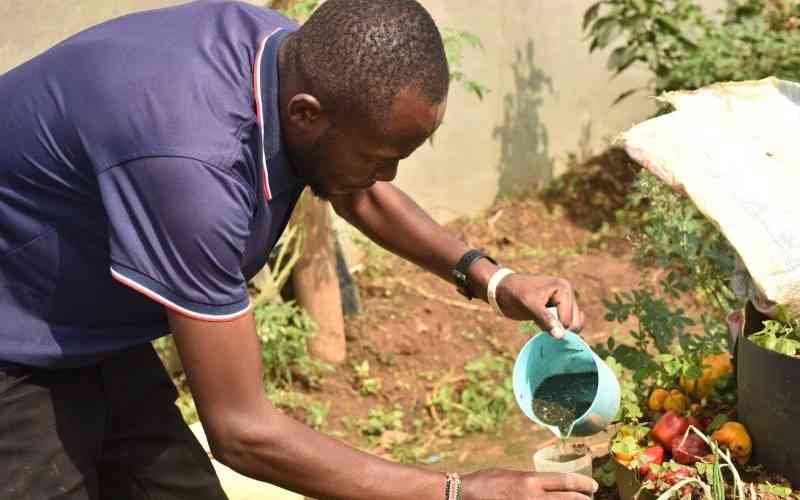Silencing critics: How Ruto's regime is stifling dissent
National
By
Benjamin Imende and Steve Mkawale
| Jan 07, 2025

In what is perceived as a shrinking democratic space under the Kenya Kwanza administration, a chilling wave of fear continues to grip those who dare to speak out.
With human rights deteriorating, an unsettling number of individuals are coming forward to reveal sinister threats and intimidation from officers believed to be linked to government agencies.
The crackdown on dissent is intensifying, with those raising concerns—whether about abductions or governance—finding themselves increasingly at risk.
From the streets, where individuals are either gunned down or beaten, to online platforms like TikTok, X, Facebook, and Instagram, the battle to speak freely is becoming ever more dangerous. People are being profiled, threatened, abducted, tortured, and/or killed.
READ MORE
Brian Okeyo: Bungoma's youthful engineer building a green future in organic farming
State to revive Nairobi financial hub plan after stuttering start
Central and Rift farmers pocket Sh1.9b from milk sales
Reprieve for tea farmers and exporters
Showdown looms as banks reject CBK's cheap loans reform plan
Tensions between Cotu, employers deepen as FKE is denied chance to address workers
Finance Bill 2025 will trigger a spike in cost of goods, experts say
Leafy suburbs property prices drop on Trump budget cuts effect
Cost of living: How salaries have changed since last Labour Day
Why you are likely to lose your land to family, not fraudsters
Accounts gathered by The Standard reveal a disturbing pattern: critics are being targeted with threatening phone calls, abductions, police surveillance, and direct verbal warnings.
READ: Police deny responsibility for abductions, promise continued investigations
Victims describe harrowing experiences, including being trailed by unknown individuals, detained without cause, and subjected to physical and psychological torture.
“I requested home delivery, and when it arrived, two officers - one in civilian clothes and another from the Administration Police—showed up,” narrated Wayua Muli, a journalist.
“They claimed the delivery man had violated traffic rules and wanted to arrest both of us. When I questioned the delivery man, he said he didn’t know them. It was the second time and now it was clearly a setup.”
Muli’s experience is not isolated as more professionals, activists, and social media influencers with significant followings have reported similar encounters. Muli, a former editor at Nation Media Group, now a podcaster, recounted a terrifying experience after criticizing the Interior Cabinet Secretary.
“For the first time in my life, there were police officers outside my door intending to arrest me. I only escaped because they lacked a valid reason to hold me. This was a clear warning,” he shared on her podcast. “If I ever go silent on any of my platforms, you know who to blame.”
In another instance, journalist Silas Nyanchwani explained that he had been warned by those he knows to reduce criticism of the government on social media, where he has a large following.
“Basically, my well-placed friends told me, ‘nitakujiwa,’ meaning I’d be dealt with. They were particularly uncomfortable with new conversations around post-election violence gathering momentum on X,” Nyanchwani said.
“We fought hard for our constitution, and we cannot afford to go back to the dark days. Freedom of expression is one of the things that sets Kenya apart because none of our neighboring countries enjoy half the freedom we have. We earned it, and we must raise our voices collectively to ensure nobody takes it away.”
Nyanchwani further noted increased surveillance and stalking on social media to silence those who questioned the government on corruption and surge on human rights abuse.
“There’s a lot of monitoring going on. Even our posts are watched by government operatives, so we must be vigilant,” he added. “I have been vocal about abductions and the fundamental right of expression. Journalists must continue speaking out.”
Gilbert Kiptalam, founder and owner of Malema TV, described receiving a threatening call from Kapseret MP Oscar Sudi. According to an OB report filed at Parklands Police Station, Nairobi County, Sudi warned him, “Hii ujinga unaandika kwa Malema TV kila siku lazima uache” (This nonsense you post on Malema TV every day must stop). Sudi allegedly added, “We (Kenya Kwanza) have decided to go head-on with critics. I don’t want your family to cry like others whose loved ones have been abducted.”
In an online video, Sudi explained that Ruto should have given him three days as an Interior CS to streamline the treatment of those criticizing him online.
ALSO READ: Grieving mothers and families demand justice as abductions surge
“If I were given the security docket, in just three days, the foolishness of posting things online would end. No country should be governed by foolishness. The country must be led with respect and the constitution, and no one should undermine the president,” Sudi boldly stated.
Boniface Oketch, team leader at Kisumu Peace, shared harrowing details of his experience with police torture and abduction.
“On July 16, they shot me with a rubber bullet. On June 23, my office was broken into, and critical items, including a computer CPU, laptops, and documents related to justice cases, were stolen. Just two days later, I was arrested after being trailed by officers in a Subaru,” Oketch recounted, adding, “I was tortured in all incidents.”
Boniface Mwangi, a prominent activist, accused the government of preparing for election manipulation.
Political analysts and opposition leaders have drawn parallels between the current situation and previous regimes, during which dissenters were jailed, tortured, or disappeared. The ongoing clampdown has sparked calls for resistance against authoritarianism. “We believe in freedom and are willing to fight for it,” said Oketch.
The National Police Service has consistently distanced itself from the recent spate of abductions.

